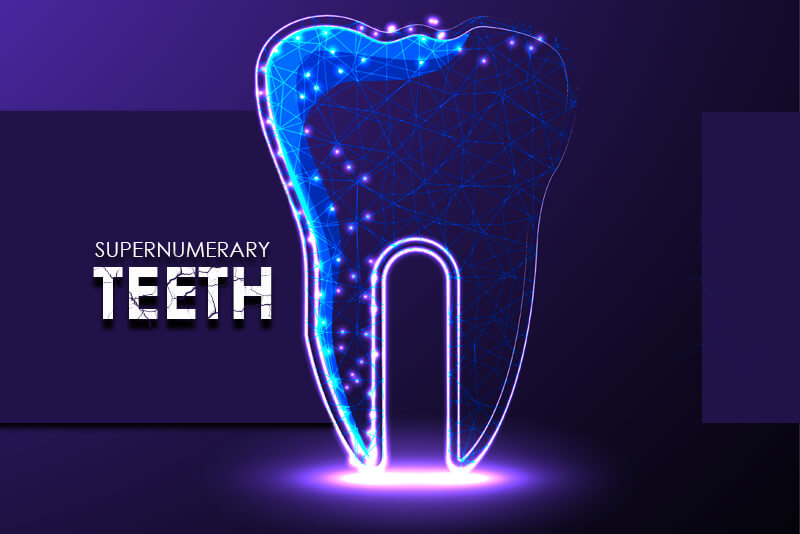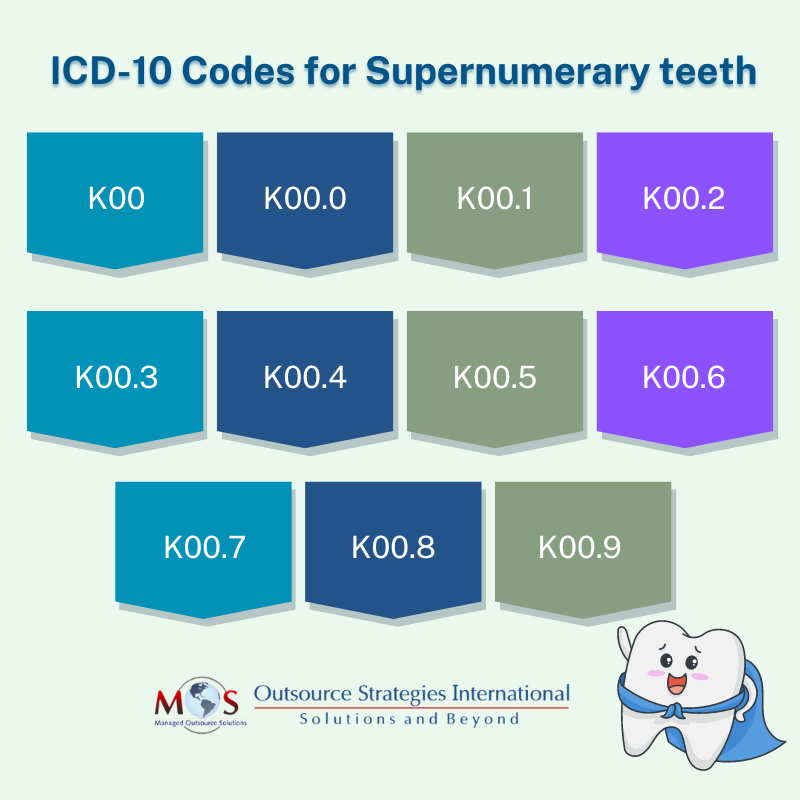Supernumerary teeth, also known as hyperdontia, are fascinating dental phenomenon characterized by the presence of extra teeth in addition to the normal number of 32 teeth inside a patient’s mouth. Although the exact causes are unknown, researchers say they might be formed due to combination of several hereditary and environmental factors during the developmental stages of dentition. They can occur anywhere in the curved areas (dental arches) where teeth attach to the jaw line and are mostly found among the permanent teeth. They may be single or multiple, unilateral or bilateral, erupted or impacted and present in one or both jaws. The prevalence of this condition varies; however, it is twice as common in adult males than adult females and comes with various challenges such as:
- Disrupts the growth of normal teeth
- Damages the root tissue of other teeth
- Premature closure of spaces in between the teeth
- Increased risk of pathologies
- Formation of oral cysts or tumors
- Emergence of teeth into the nasal cavity
- Issues with proper chewing
Billing and coding for this specific dental condition can be challenging. Reliable dental billing services provided by AAPC-certified coding specialists can help in accurate and timely billing and claims submission.
Enhance patient care, reduce administrative work and optimize revenue with our dedicated dental billing support!
Causes of Supernumerary Teeth
The main etiology explaining the cause of hyperdontia doesn’t exist, but there are several theories proposed, and the most probable hypothesis accepted so far is that the teeth develop as a result of hyperactivity of dental lamina or dichotomy of tooth bud. The extra teeth can appear in anyone but are more often associated with people who have congenital genetic conditions such as
- Gardner’s syndrome (a rare genetic disorder)
- Down syndrome
- Ehlers-Danlos syndrome
- Cleidocranial dysplasia
- Anderson-Fabry disease
- Ellis-Van Creveld syndrome
- Cleft lip and palate
Types of Supernumerary teeth
Supernumerary teeth are classified according to morphology or location. The morphology of supernumerary teeth is further divided into eumorphic and dysmorphic. The classification is as follows:
According to morphology
- Conical
- Tuberculate
- Supplemental
- Compound and complex Odontoma
According to location
- Mesiodens
- Paramolar
- Distomolar
- Parapremolar
Diagnosis of Supernumerary teeth
Hyperdontia is frequently situated in the maxillary anterior region more than the mandible and might cause aesthetic and functional problems such as delayed eruption, displacement of permanent teeth, cysts, dental crowding, and occlusive disturbance. The prevalence of supernumerary teeth ranges from 0.3% to 0.6% in the primary dentition and the prevalence of supernumerary teeth is reported to be between 0.5% to 5.3% in the secondary or permanent dentition.
Hyperdontia is a condition that doesn’t have a standard symptom so, while some patients don’t have any issues, others might experience significant dental complications. Diagnosis of this dental disorder is quite easy if the extra teeth have already grown. If supernumerary teeth do not cause pain and are not visible, then they may be identified only through radiographic procedures during routine examination.
For the precise diagnosis and treatment of hyperdontia, clinical examination and findings should be supported by comprehensive radiographic testing and report. Several imaging tests such as – dental X-rays and CT scans may be performed for a more detailed analysis of the mouth, jaw, and teeth. Certain cases of hyperdontia do not require any specific treatment, while other cases involve removing the extra teeth.
Treatment of Supernumerary teeth
Following the diagnosis of supernumerary teeth, the decision for the treatment depends on whether hyperdontia develops any clinical complications such as:
- Tooth decay
- Overcrowding
- Gum disease
- Infections, such as gingivitis
- Diastema
- Pain or discomfort while chewing
- Damage to the root of other teeth
- Cyst formation
The treatment for this dental disorder varies as it is a highly individualized condition. It depends on the type and position of the supernumerary teeth and how it affects the adjacent teeth. If the extra teeth cause only mild discomfort, the dentist may recommend non-steroidal anti-inflammatory drugs (NSAIDs), such as ibuprofen (Advil, Motrin) for pain. Other treatment modalities include – removal of the teeth when possible (performed under local or general anesthesia). In certain other cases, supernumerary teeth may need to be cut and then removed in pieces. Endodontic treatment (also known as a root canal) may also be done to treat the tooth pulp as well as surrounding tissues.
How to Code and Bill Supernumerary Teeth
The treatment modalities and other screening tests performed by dentists, orthodontists, and other dental specialists must be carefully documented using the correct medical codes. The American Dental Association (ADA) uses the standardized coding system Current Dental Terminology (CDT) codes, and it is important to note that there are no separate CDT codes created specifically for supernumerary teeth. So, to submit a dental claim for the dental service rendered, you must chart the tooth number along with the CDT code for the procedure performed. For example, if you performed supernumerary tooth extraction, then you must find the allocated tooth number and then use the appropriate CDT codes such as D7140 or D7210 for the type of extraction. Submit the accurate dental details to a dental billing company for processing the dental insurance verification and prompt payment.
To chart supernumerary teeth, here are the guidelines recommended by the ADA:
- To chart supernumerary permanent teeth, add 50 to the assigned tooth number. The teeth are numbered sequentially from 1 to 32 and if supernumerary tooth removed is adjacent to the tooth number 1, then supernumerary tooth is assigned the value of 51 (1+50).
- To chart supernumerary primary teeth, add ‘S’ adjacent to the assigned tooth letter. Letter A to J denote upper primary teeth and letters K to T denote lower primary teeth. If the supernumerary primary teeth was adjacent to the teeth denoted C, then the value entered would be CS for supernumerary teeth.
ICD-10 codes for supernumerary teeth include –
K00 Disorders of tooth development and eruption
- K00.0 Anodontia
- K00.1 Supernumerary teeth
- K00.2 Abnormalities of size and form of teeth
- K00.3 Mottled teeth
- K00.4 Disturbances in tooth formation
- K00.5 Hereditary disturbances in tooth structure, not elsewhere classified
- K00.6 Disturbances in tooth eruption
- K00.7 Teething syndrome
- K00.8 Other disorders of tooth development
- K00.9 Disorder of tooth development, unspecified
As mentioned above, most cases of supernumerary teeth do not require any specific treatment. In other cases, patients need to remove some or all of their extra teeth to avoid further problems. It is not necessary to remove natal teeth unless the supernumerary teeth are loose and present a risk for aspiration due to passage into the lung. Billing and coding services provided by a professional and reliable dental billing company can help physicians use the correct codes to report their diagnoses and treatments.





